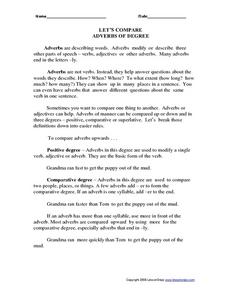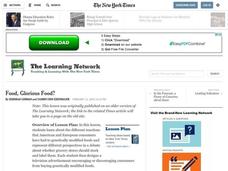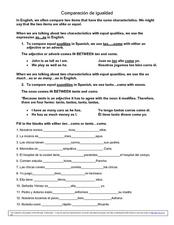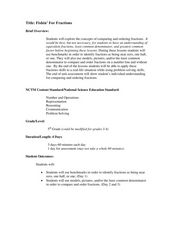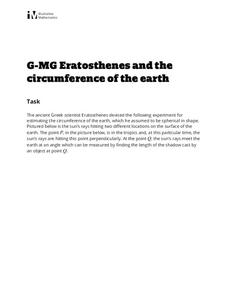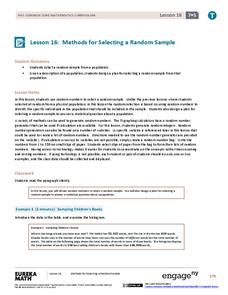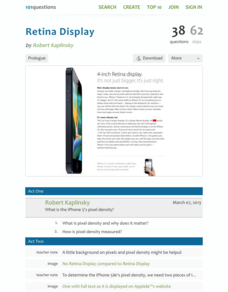Curated OER
Comparing Michigan to Other States
Fourth graders work in groups of 2 or 3 and choose a state to compare with Michigan. They use the Internet to locate information on other states allowing students time to research how Michigan compare to their state and incorporate their...
Curated OER
Comparing Roots After Rotation of Ninety Degrees
Young scholars conduct an experiment and use different measurements of a single root to illustrate the mechanism of plant movement.
National Wildlife Federation
Endangered Species: What and Where?
What do endangered species have in common with non-endangered species? Given an endangered species to read about, individuals choose another species that is not endangered to compare it to. As a class, they create a species book with the...
Las Cumbres Observatory
Star In a Box (Paper-Based)
Do stars age gracefully? Young astronomers use colored paper and data on luminosity and temperature to model the changes of a star during its lifetime. They then compare models of stars of different mass and radii.
American Chemical Society
Dissolving an M&M
Here's a sweet lesson to explore solutes and solvents. Using candies and water, learners observe properties of parts of the solution as the candies dissolve. They then modify the setup and note variations in the solution.
Curated OER
Creepers and Climbers
Students compare vines. In this vines lesson plan, students analyze the adaptations common in vines. Students determine if the vine grows using tendrils, modified roots, or twining stems. Students explore a forest area to flag different...
Curated OER
Let's Compare Adverbs of Degree
In this adverbs of degree worksheet, students fill in the blanks to 8 facts about adverbs of degree and change 3 words into comparative degree and change 3 words to use the superlative degree to compare those words downward.
Curated OER
Food, Glorious Food?
How are the reactions between American and European consumers different when it comes to genetically modified foods? Use the New York Times article "Consumers in Europe Resist Gene-Altered Foods" to inform your middle schoolers...
Curated OER
Comparación de igualdad
Now that your Spanish speakers converse pretty fluidly, teach them how to compare two things with equal qualities. The first section provides an explanation, and there are fill-in-the-blank questions on the bottom half.
Curated OER
Multiplication: Bugs Can Multiply, So Can I!
Develop multiplication skills with your class. Youngsters will visualize multiplication as repeated addition. Then they will create a multiplication bug book and discover arrays as a strategy for multiplication problem solving....
Curated OER
Basic Uses of Prepositions Resource Page
In this basic uses of prepositions resource worksheet, students examine a the wide variety of uses of prepositions. They study prepositions of place, position, direction, time, and manner by reading the examples.
Curated OER
Fishin' For Fractions
Fifth graders compare fractions. In this fraction lesson, 5th graders identify whether a fraction is closest to zero, half, or one and use common denominators. They put fractions in order and complete real-life fraction questions.
Curated OER
Gingerbread Baby v. Gingerbread Boy #7
Students read two stories. In this comparison lesson, students read "The Gingerbread Baby," by Jan Brett and the original "Gingerbread Boy." Students use a Venn Diagram to compare and contrast the two stories.
Curated OER
Comparing the New Madrid and San Andreas Fault Zones
In this faults worksheet, students use an earthquake reference sheet to find the numbers for a modified Mercalli and Richter scale. They compare the San Andreas Fault zone and the New Madrid fault zone on the United States map. They...
Curated OER
Comparing the Impact of Multiple Uses
Students study multiple land uses and their effects on one another. They assess multiple land uses in National Forests and Grasslands and evaluate the effects of each use on all other uses. They develop a comprehensive list of human...
Curated OER
Hazards: Fourth Grade Lesson Plans and Activities
Learn about damage associated with earthquakes and materials that best withstand a quake. A lab engages class members in the experimental design and construction of sturdy structures that can endure various earthquake...
PBL Pathways
Medical Insurance
Design a plan for finding the best health insurance for your money. Learners compare two health plans by writing and graphing piecewise functions representing the plan rules. Using Excel software, they create a technical report...
Scholastic
Quick as a Cricket Lesson Plan
Teaching young learners about similes is easy as pie with this primary grade language arts instructional activity. Following a class reading of the children's book, Quick as a Cricket by Audrey Wood, young readers learn the...
Illustrative Mathematics
Eratosthenes and the Circumference of the Earth
The class gets to practice being a mathematician in ancient Greece, performing geometric application problems in the way of Eratosthenes. After following the steps of the great mathematicians, they then compare the (surprisingly...
Teach Engineering
The Great Gravity Escape
Groups simulate an orbit using a piece of string and a water balloon. Individuals spin in a circular path and calculate the balloon's velocity when the clothes pin can no longer hold onto the balloon.
Virginia Department of Education
Special Right Triangles and Right Triangle Trigonometry
Right triangles are so special! Use special right triangles to discover the trigonometric ratios. Pairs construct special right triangles and find the values of the ratios of the sides. In the process, they discover the ratios stay the...
EngageNY
Methods for Selecting a Random Sample
Random sampling is as easy as choosing numbers. Teams use random numbers to create a sample of book lengths from a population of 150 books. The groups continue by developing a technique to create samples to compare from two populations...
101 Questions
Retina Display
Learners calculate the pixel density of a specific cell phone using the concept of similarity. They use information from the cell phone's website to make their calculations and then compare their results to the posted information.
Beauty and Joy of Computing
Sprite Drawing and Interaction
Discover how to program objects to move on a screen. In the second lab of a five-part unit, each learner uses block instructions to program a sprite to follow their mouse (cursor). They investigate how to use these same block...








